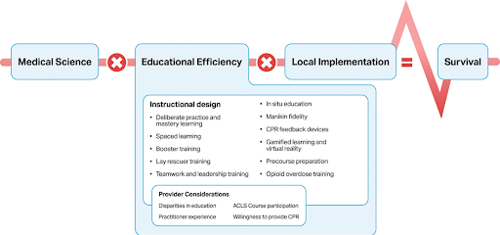Blended Learning in Resuscitation: Combining Online Learning with Practical Hands-On Training
Resuscitation education and training is an annual event for most healthcare professionals. This will encompass basic life support training for all clinical staff, and expand into adult and paediatric advanced life support training for staff working in specific clinical areas or roles. Traditionally this education has been delivered in a fully face to face mode, to ensure that the theoretical knowledge and practical skills have been fully mastered by all clinicians. The increasing use of technology and move into online learning options has expanded the options for delivering education, including resuscitation education. Theory can now be delivered in high quality and engaging modes, and allow educators to focus on the practical skills that are necessary in resuscitation.
Resuscitation education will always require a hands-on component that supports the practical application of skills. The 2020 ILCOR Guidelines, support a blended approach to resuscitation education where eLearning is used to replace the time spent on theory in a classroom setting. The research used to support this new resuscitation guideline, identifies that not only do learners prefer this style of learning, eLearning enhances the overall learning experience and retention of skills particularly where the learning is used as an ongoing tool to provide regular updates and retraining opportunities. In their top 10 take-home messages for resuscitation education science, the education taskforce state “Implementation of a spaced learning approach for resuscitation training improves clinical performance and technical skills compared with massed learning” . The benefits of self-paced online learning include breaking up the theory into smaller components if time is restricted, the ability to watch sections again if the message was not understood initially, and the time to digest the information presented prior to the hands-on sessions. Completing learning in this way prepares the clinician more thoroughly, their attendance at the face to face component can focus on the application of the practical skills, putting their knowledge into resuscitation roles during scenario simulations. Another key advantage of a blended approach is the reduction in lost time where time away from clinical responsibilities is decreased. This has benefits for both the clinician and organisations supporting this type of learning.
Some learners will prefer the traditional approach, with classroom theory followed by practical skills. Those learners prefer the ability to ask the educator questions in real time, and ensure they are not distracted by other priorities during the theoretical aspects. It is important to recognise your own preference whilst learning, so you can choose the option that meets your individual needs.

If you are due to update your basic and/or advanced life support skills, we offer a range of workshops to meet your needs. We have public events in Melbourne, Sydney, Newcastle and Brisbane in 2021. These workshops utilise a problem-solving approach and are based upon the current Australian Resuscitation Council guidelines.
For a full list of events and courses please visit https://medcast.com.au/critical-care.
References:
Cheng. A., Magid D., Auerbach M., et al 2020 Part 6: Resuscitation Education Science: 2020 American Heart Association Guidelines for Cardiopulmonary Resuscitation and Emergency Cardiovascular Care Circulation Vol 142 suppl 2.
Garrison, D. & Kanuka, H. 2004. Blended Learning: Uncovering Its Transformative Potential in Higher Education. Internet and Higher Education 7, 95 –105.
Lockey, A., Dyal, L., Kimani, P., Lam, J., Bullock, I., Buck, D., Davies, R., & Perkins, G. 2015. Electronic learning in advanced resuscitation training: The perspective of the candidate. Resuscitation Dec, 97, 48-54, doi: 10.1016/j.resuscitation.2015.09.391.
Moon, H., & Hyun, H.S. Nursing students’ knowledge, attitude, self-efficacy in blended learning of cardiopulmonary resuscitation: a randomized controlled trial. BMC Med Educ 19, 414 (2019). https://doi.org/10.1186/s12909-019-1848-8.

Crystal Smith is a Senior Education Consultant for Critical Care Education Services (part of the Medcast Group). She has a clinical background in critical care, paediatrics and education.
Become a member and get unlimited access to 100s of hours of premium education.
Learn moreFollow James, a 7-year-old boy scheduled for a tonsillectomy and adenoidectomy, as we explore how the 4 P’s of child preparation – Prepare, Play, Parent, Praise – can be used in day surgery to reduce procedural anxiety, support family-centred care, and improve the overall patient experience
Caregiver concern is a powerful predictor of clinical deterioration in children, often surpassing abnormal vital signs. A recent Lancet study confirms its association with ICU admission and ventilation. Integrating caregiver input into assessments, documentation, and escalation protocols can significantly improve early recognition and outcomes in paediatric emergency care.
Sepsis is a time-critical medical emergency. The National Sepsis Program urges GPs and primary care clinicians to enhance early recognition and management of sepsis to save lives. This update outlines key actions and available resources to support timely diagnosis and intervention across primary care settings.
